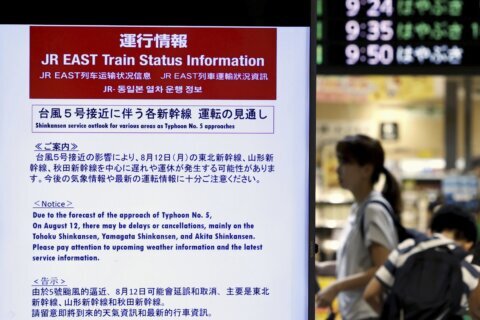DHAKA, Bangladesh (AP) — Bangladesh’s Chief Justice Obaidul Hassan resigned Saturday following new protests by a group of students and other demonstrators, as the country’s interim government led by Nobel laureate Muhammad Yunus started functioning days after a mass uprising forced Prime Minister Sheikh Hasina to resign and flee to India.
Asif Nazrul, law, justice and parliamentary affairs adviser to the interim government, said in a video message posted on Facebook that his office received the resignation letter and they would forward it to the country’s figurehead President Mohammed Shahabuddin for further procedures.
Five other top judges in the Supreme Court also resigned later on Saturday, in an attempt by the new government to reorganize the judiciary.
Tensions rose Saturday morning after the chief justice called for a meeting of the judges of the country’s High Court and the Supreme Court to discuss the working of the judiciary under the new government. The protesters thronged the court premises and demanded that the chief justice and other judges of the top court step down.
A key student leader Asif Mahmud — who was appointed as an adviser at the Ministry of Youth and Sports — urged his supporters to gather at the court premises to press for their unconditional resignations, in a Facebook post in the morning.
The students say the judiciary should perform without any influence from politicians and other authorities.
“We all believe that these justices have not only favored the previous government, but we also believe they have been in the pockets of that party. So, we don’t want any corrupt justices in the judiciary,” said Tahsim Uzzaman, a 26-year-old student of governance and English literature, adding that “we want a whole new system — the entire point of the movement is no discrimination and that’s not possible if there is still corruption in place.”
On Thursday, Yunus was sworn in, and 16 other members were included in his interim Cabinet, who were drawn mainly from civil society and included two student protest leaders after the president dissolved Parliament. New Cabinet members were chosen after talks earlier this week between student leaders, civil society representatives and the military.
On Saturday, Yunus visited the family of a student who died in the northern district of Rangpur, triggering nationwide protests and violence. The death of the 25-year-old Abu Sayeed became a symbol of the protest as he spread his two hands, inviting police to open fire on him. He then fell and doctors declared him dead later. The video spread quickly on social media and the unrest spread.
Yunus was accompanied by two student leaders who were included in the interim Cabinet.
“We have to stand the way Abu Sayeed stood,” he said after visiting the family.
“Abu Sayeed’s mother is everyone’s mother. We have to protect her, protect her sisters, protect her brothers. Everyone has to do it together,” Yunus added.
Protests by students began in July against a quota system for government jobs that critics said benefitted people with connections to Hasina’s party. She resigned and fled to India Monday after the protests morphed into a movement against her government, leaving more than 300 people dead including students and police officers in the ensuing violence.
Yunus was awarded the 2006 Nobel Peace Prize for helping the poor with his work developing a microcredit market in Bangladesh. He was in Paris for the Olympics when he was chosen for the interim role.
He called for peace and promised to bring reforms. The interim government is expected to announce a new election, but it is not clear how long they wish to stay in power and when the elections could be held. The country’s main opposition demanded a new election in three months, but that is unlikely to happen, according to analysts.
Nazrul said that the Yunus-led government would remain in power as long as necessary, trying to address the desires of people and political parties for “reforms” and “election.”
Hasina’s Awami League party has not said anything specific about the election timeframe, but her son Sajeeb Wazed Joy said that an election without their party would not be acceptable as it is “the largest” party in Bangladesh.
Yunus had a frosty relationship with Hasina, who had called him a “bloodsucker” allegedly for using force to extract loan repayments from rural poor, mainly women. Yunus denied the allegations.
He faced many court cases and was convicted by a court for violating the country’s labor law and sentenced to six months in jail. But he was on bail upon appeal, and before his appointment, he was acquitted of the charges.
He was quickly selected as the head of the interim government when Hasina’s downfall created a vacuum and left the future uncertain for Bangladesh, which has a history of military rule and myriad crises.
Hasina, 76, was elected to a fourth consecutive term in January, but the vote was boycotted by her main opponents, with thousands of opposition activists detained beforehand. The U.S. and U.K. denounced the result as not credible. Hasina’s critics say her administration increasingly was marked by human rights abuses and corruption, and was following a streak of authoritarianism.
The chaos on Bangladesh’s streets continued after her resignation. Dozens of police officers were killed, prompting police to stop working across the country.
The military is helping police officers to return to work but it will take more time to get rid of their trauma and to restore police administration to its full functionality.
———
AP writer Krutika Pathi contributed to the report.
Copyright © 2024 The Associated Press. All rights reserved. This material may not be published, broadcast, written or redistributed.







